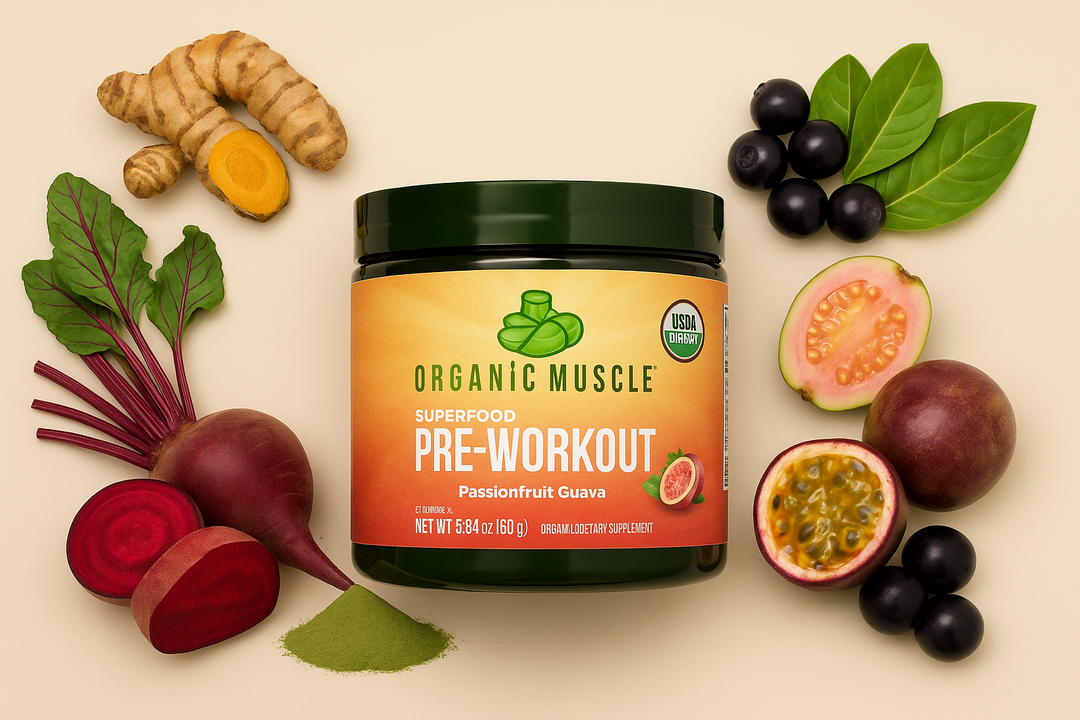Welcome to the world of fitness and holistic wellness! If you're a health enthusiast looking to elevate your workout routine or improve your overall well-being, you've likely come across the term BCAAs. But what exactly are BCAAs and why are they gaining popularity in the fitness community?
BCAAs, or Branched-Chain Amino Acids, refer to a group of essential amino acids that play a crucial role in muscle growth, repair, and overall performance. The three key BCAAs include leucine, isoleucine, and valine, which are not produced by the body and must be obtained through diet or supplementation.
But why are BCAAs essential for your fitness journey? Well, these powerful amino acids have been shown to support muscle recovery, reduce muscle soreness, and enhance endurance during workouts.
Understanding BCAAs: The Basics
BCAAs, which stands for branched-chain amino acids, are a group of essential amino acids that your body can't produce on its own. These amino acids—leucine, isoleucine, and valine—are crucial for muscle growth, repair, and overall exercise performance.
Leucine: Known as the powerhouse among the BCAAs, leucine plays a significant role in muscle protein synthesis, which is essential for building and repairing muscles after a workout. It also helps regulate blood sugar levels and provides energy to your muscles during exercise.
Isoleucine: This amino acid is vital for the production of hemoglobin, the protein in red blood cells that carries oxygen to your muscles. It also helps with energy regulation and endurance during physical activity.
Valine: Valine works hand in hand with the other BCAAs to promote muscle growth and repair. It also plays a role in maintaining nitrogen balance in the body, essential for overall muscle function.
At Organic Muscle, we understand the importance of BCAAs in optimizing your performance and recovery. That's why our products are carefully formulated to provide you with the highest quality, USDA Certified Organic BCAA supplements that support your fitness goals naturally and effectively.
The Essential Trio: Leucine, Isoleucine, and Valine
BCAAs are made up of three essential amino acids: leucine, isoleucine, and valine. These amino acids are considered essential because the body cannot produce them on its own, so they must be obtained through diet or supplementation.
Leucine: Known as the "anabolic trigger," leucine plays a crucial role in protein synthesis, which is essential for muscle growth and repair. It activates a pathway in the body that stimulates muscle protein synthesis, helping to increase muscle mass and strength. Leucine is also believed to help regulate blood sugar levels and support energy production during exercise.
Isoleucine: This amino acid is essential for the formation of hemoglobin, which carries oxygen to tissues throughout the body. Isoleucine also plays a role in regulating blood sugar levels and energy production. Additionally, it is involved in muscle metabolism and helps prevent muscle breakdown during intense exercise.
Valine: Valine is important for muscle metabolism, tissue repair, and the maintenance of nitrogen balance in the body. It is also involved in energy production and can be used as a source of fuel during prolonged exercise. Valine works synergistically with the other BCAAs to support muscle growth, repair, and recovery.
How BCAAs Fuel Your Body
Branched-chain amino acids (BCAAs) are a group of essential amino acids that play a crucial role in muscle growth, repair, and overall athletic performance. Leucine, isoleucine, and valine are the three amino acids that make up BCAAs. These amino acids are considered essential because our bodies cannot produce them on their own, hence the need to obtain them through diet or supplementation.
Boost Muscle Growth
Leucine, in particular, has been shown to stimulate muscle protein synthesis, a process essential for muscle growth and repair. By increasing the rate of protein synthesis in muscle cells, BCAAs aid in building and maintaining lean muscle mass, making them a go-to supplement for athletes and fitness enthusiasts looking to maximize their gains.
Decrease Muscle Soreness
During intense workouts, muscles undergo stress and damage, leading to soreness in the days that follow. BCAAs have been found to reduce muscle soreness and speed up the recovery process by decreasing exercise-induced muscle damage. This means you can bounce back quicker from tough workouts and get back to training at your best.
Enhance Energy Levels
BCAAs can also serve as a source of energy during exercise, particularly during endurance activities like running or cycling. When glycogen stores become depleted, BCAAs can be converted into glucose in the muscles, providing a quick source of energy to fuel your workouts and push through fatigue.
Preserve Lean Muscle Mass During Weight Loss
When cutting calories to lose fat, there's a risk of losing muscle mass along with fat. BCAAs can help preserve muscle tissue during periods of calorie restriction, making them a valuable tool for maintaining muscle mass while striving to achieve a leaner physique.
Incorporating BCAAs into your fitness routine can provide a range of benefits, supporting muscle growth, recovery, energy levels, and overall performance. Whether you're an avid weightlifter, endurance athlete, or simply looking to enhance your workouts, BCAAs can be a valuable addition to your supplement regimen.
BCAAs for Recovery: Reducing Muscle Soreness and Damage
Muscle soreness is a common occurrence after intense workouts, often referred to as delayed onset muscle soreness (DOMS). It's a sign that your muscles are repairing and growing stronger. However, excessive soreness can hinder your progress and leave you feeling fatigued. This is where BCAAs come into play.
Reducing Muscle Soreness: Branched-chain amino acids (BCAAs) have been shown to aid in reducing muscle soreness post-exercise. By taking BCAAs before or after your workout, you can help alleviate muscle soreness and speed up the recovery process. Leucine, one of the essential amino acids in BCAAs, plays a crucial role in muscle protein synthesis, which is essential for muscle repair and growth.
Preventing Muscle Damage: BCAAs may also help in preventing muscle damage during intense physical activity. When you engage in strenuous workouts, especially weightlifting or high-intensity training, your muscles undergo stress that can lead to microscopic damage. BCAAs act as a buffer against this damage, reducing the breakdown of muscle tissue and promoting faster recovery.
Enhancing Recovery: In addition to reducing muscle soreness and damage, BCAAs can enhance overall recovery. By providing your muscles with the necessary amino acids they need for repair and growth, BCAAs support a quicker recovery time between workouts. This means you can get back to training sooner and maintain a consistent workout schedule without prolonged downtime due to muscle fatigue or soreness.
Diving Into the Science: How BCAAs Work
If you want to take your fitness game to the next level, understanding the science behind BCAAs is key. Branched-Chain Amino Acids (BCAAs) are a group of essential amino acids – leucine, isoleucine, and valine – that play a crucial role in muscle building and repair.
When you hit the gym for an intense workout, your muscles undergo stress and damage. This is where BCAAs come in handy. Leucine, in particular, is known to activate a key protein synthesis pathway in the muscle, stimulating muscle growth. Isoleucine helps regulate your blood sugar levels during exercise, providing you with sustained energy. Valine aids in muscle metabolism and tissue repair, helping you recover faster post-workout.
BCAAs can be readily absorbed by the muscles, making them an excellent source of instant energy during your training sessions. They also have the unique ability to bypass the liver and gut, directly entering the bloodstream, where they can be transported to the muscles for quick utilization.
BCAAs vs. Whey Protein: A Comparative Study
When it comes to fitness supplements, Branch Chain Amino Acids (BCAAs) and whey protein are two powerhouse options that often find themselves pitted against each other. Let’s break down the differences between these popular choices to help you decide which one suits your needs best.
BCAAs Overview
BCAAs consist of three essential amino acids: leucine, isoleucine, and valine, which play a crucial role in muscle protein synthesis and energy production. They are rapidly absorbed by the body and are particularly beneficial for maintaining muscle mass and reducing muscle soreness during and after workouts. BCAAs are popular among those looking to maximize muscle growth and recovery while minimizing muscle breakdown.
Whey Protein Overview
On the other hand, whey protein is a complete protein source derived from milk and is rich in all essential amino acids, including BCAAs. It is a popular post-workout supplement due to its quick absorption rate, making it ideal for promoting muscle recovery and growth. Whey protein is also beneficial for those aiming to increase their daily protein intake and support weight loss or muscle-building goals.
BCAAs in Your Diet: Natural Sources
If you're looking to incorporate more BCAAs into your diet naturally, here are some food sources that are rich in these essential amino acids:
Lean Meats
Beef, chicken, turkey, and other lean meats are great sources of BCAAs. They not only provide high-quality protein but also contain all three BCAAs – leucine, isoleucine, and valine.
Eggs
Eggs are a complete protein source that contains all nine essential amino acids, including BCAAs. Enjoy them boiled, scrambled, or in an omelet for a BCAA boost.
Fish
Fatty fish like salmon, tuna, and mackerel are not only rich in omega-3 fatty acids but also pack a good amount of BCAAs. Include fish in your meals to up your BCAA intake.
Dairy Products
Greek yogurt, cottage cheese, and milk are excellent sources of BCAAs. These dairy products are not only versatile but also provide a good amount of protein and essential amino acids.
Legumes and Nuts
Foods like chickpeas, lentils, peanuts, and almonds are plant-based sources of BCAAs. They are also rich in fiber, making them a healthy addition to your diet.
Quinoa
This pseudo-grain is a complete protein source and contains all nine essential amino acids, including BCAAs. Add quinoa to your salads, stir-fries, or enjoy it as a side dish.
BCAAs and Hydration: What You Need to Know
BCAAs, or Branch-Chain Amino Acids, are not just for building muscle; they're also key for staying hydrated during intense workouts. These essential amino acids—leucine, isoleucine, and valine—help with muscle protein synthesis and energy production. But importantly, they can improve hydration by reducing fatigue and maintaining electrolyte balance.
Leucine, in particular, promotes water intake and helps keep cells hydrated, enhancing performance and recovery. BCAAs also protect muscles from breakdown during exercise, supporting endurance and preventing dehydration. For better hydration and workout performance, it's beneficial to consume BCAAs before and during intense or long exercise sessions. Adding Organic Muscle's organic BCAA supplements to your routine can boost hydration and help you achieve your fitness goals.
Final Thoughts
Whether you're a dedicated athlete, a weekend warrior, or simply someone looking to support their overall health and wellness, BCAAs can be a game-changer. From boosting muscle growth and reducing fatigue to enhancing recovery and supporting immune function, the benefits of BCAAs are vast and undeniable.
So why settle for mediocrity when you can strive for greatness? Elevate your fitness game with BCAAs from Organic Muscle and experience the power of clean, natural supplementation. Remember, at Organic Muscle, we don't just believe in fitness — we believe in holistic wellness. Make the choice to prioritize your health and performance today and reap the rewards tomorrow.
Read More:
- Decoding Health Food Labels: Unmasking Hidden Ingredients For Informed Eating
- Navigating The Mind: The Intricate Psychology Behind Diet Trends
- Elevating Your Life: A Comprehensive Exploration Of Biohacking And Human Enhancement For Optimal Health And Wellness
Frequently Asked Questions
What are BCAAs?
BCAAs, or Branched-Chain Amino Acids, are a group of essential amino acids that include leucine, isoleucine, and valine. They play a crucial role in muscle growth and repair.
Why do you need BCAAs?
BCAAs are essential because our bodies cannot produce them naturally, so we need to obtain them through our diet or supplementation. They are vital for muscle protein synthesis and energy production.
How do BCAAs aid in muscle growth?
BCAAs stimulate protein synthesis in muscles, helping to increase muscle mass and strength. They also reduce muscle soreness and fatigue during and after workouts.
What are the sources of BCAAs?
Good dietary sources of BCAAs include meat, dairy products, eggs, and certain plant-based sources like legumes and nuts. BCAAs can also be taken in supplement form.
Are BCAAs necessary for athletes?
Yes, BCAAs are particularly beneficial for athletes and active individuals as they help to prevent muscle breakdown, improve exercise performance, and aid in recovery.
How do BCAAs prevent muscle breakdown?
BCAAs can help to prevent muscle breakdown by serving as energy sources during intense exercise, reducing the breakdown of muscle proteins for energy.
What is the best time to take BCAAs?
It is generally recommended to take BCAAs before, during, or after your workout to support muscle recovery and growth. Some people also take them between meals to maintain muscle protein synthesis throughout the day.
Can BCAAs improve recovery time after workouts?
Yes, BCAAs can help improve recovery time by reducing muscle soreness and promoting muscle repair. They can also replenish glycogen stores and reduce muscle tissue damage.
Are there any side effects of taking BCAAs?
When taken in recommended doses, BCAAs are safe for most people. However, in some cases, excessive intake may cause digestive issues like bloating and nausea. It's essential to follow the recommended dosage guidelines.
How do BCAAs enhance exercise performance?
BCAAs can enhance exercise performance by reducing fatigue, preserving glycogen stores, promoting endurance, and supporting muscle recovery. They can also help maintain mental focus and promote hydration during workouts.
|
Disclaimer: Organic Muscle products are not intended to treat, diagnose, mitigate, prevent, or cure disease. Organic Muscle products should not replace prescribed medications or the variety of foods important to a healthful diet. |












